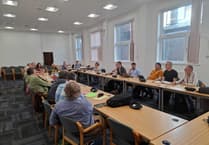PEOPLE living in the country’s most deprived communities would have a walk in nature just 20-minutes from their doorstep, on average, if the nation’s 1.5 million hectares of woodland (the equivalent of more than 2.2 million football pitches) were made accessible to the public, according to new research commissioned by leading walking charity, the Ramblers.
Now, the charity is calling on the UK government to expand the Countryside and Rights of Way (CRoW) Act 2000 to make it more equal and give everyone access to natural landscapes closer to where they live.
Adding woodland to the Act would double the amount of land in England where people have the freedom to roam from eight per cent to 17.5 per cent, according to the analysis.
The research found on average people living in the poorest communities must travel almost twice (48 per cent) as far – six kilometres or an hours’ walk - as people living in the wealthiest communities, to access natural landscapes where they have the freedom to roam.
This could be reduced to less than two kilometres – a distance that is easily walkable in 20-minutes and can be achieved in a lunchtime or an evening, if woodlands were accessible to the public.
The freedom to roam allows people access to wilder landscapes for the purposes of walking and exploring, without always having to keep to designated paths or risk trespassing.
Established 22 years ago (November 30, 2000) the Countryside and Rights of Way Act (CRoW), granted the public the freedom to roam respectfully across some of England’s natural landscapes including mapped areas of mountains, moors, heathland and downland.
However, almost two-thirds of these allocated landscapes are concentrated in the north-west within the Lake District, the Peak District and the Yorkshire Dales National Park, making them inaccessible to many.
Woodlands, watersides and a lot of grasslands are not currently accessible to the public under the CRoW Act but are more evenly spread across the country, including near to urban areas where 82.9 per cent of England’s population (56.3 million people) are living.
Opening-up these landscapes could bring nature closer to the vast majority of people in the country, including the one in eight households in the UK that have no access to a private or shared gardens.
Furthermore, people’s ability to connect with nature has many proven health benefits.
A recent study found at least two hours’ contact with nature per week led to more people reporting good health and wellbeing, while other studies have shown increases in happiness and life satisfaction.
Connecting with nature can also help alleviate depression, anxiety, and other mental health conditions.
Walking is one of the easiest and most affordable forms of exercise.
It can help people to reduce their risk of serious illness, boost energy levels and improve mood.
The NHS recommends 150 minutes of exercise per week to help people maintain active lifestyles.
Ross Maloney, CEO of The Ramblers, said: “No one should have the monopoly on nature and that is why as a charity, we work to open and protect outdoor spaces for everyone to enjoy.
‘‘Woodlands could be the key to unlocking nature for those who need it the most, bringing it within walking distance of their homes.
‘‘But instead, much of this land, which can be found right across the country including near urban areas, remains woefully unutilised and off-limits to the public.
‘‘Closing the gap between nature and where people live is crucial for levelling-up our communities and fostering people’s life-long connection to the natural environment. It also helps overcome the barriers preventing people from accessing the outdoors, which are currently amplified by the cost-of-living crisis.
‘‘Expanding the Countryside and Rights of Way Act to woodland is one of the most important things the UK government can do now to improve people’s health, wellbeing and their attachment to the very landscapes that must be protected for the sake of our planet and future generations.”




.jpeg?width=209&height=140&crop=209:145,smart&quality=75)
Comments
This article has no comments yet. Be the first to leave a comment.